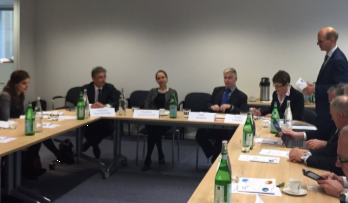On Wed, March 8th Cerame-Unie hosted a workshop on “Energy prices and costs in the ceramic industry”. It brought together officials from the European Commission, Tom Howes (DG Energy) and Elisabeth Hamdouch (DG Grow) as well as academics - Christian Egenhofer, Senior Research Fellow at the Centre for European Policy Studies (CEPS) and ceramic industry representatives in order to present the outcomes of the European Commission’s Energy prices and costs report. The workshop was moderated by Laura Cohen, Chief Executive at British Ceramic Confederation (BCC). Tom Howes mentioned that among others the goal of the study was to address the industrial competitiveness in Europe and that industry can keep being competitive by reducing energy costs through energy efficiency measures. Laura Cohen (BBC) stressed that the EU ceramic industry has become much more energy efficient, but still the energy intensive sectors are largely sensitive to higher energy prices. Elisabeth Hamdouch (DG Grow) thanked the ceramic industry for its participation in the data collection acknowledging that the study was possible thanks to involvement of the sectors. She stressed that it is a big challenge for the industry to comply with the EU climate and energy goals and to contribute to the development of the new technologies in order to ensure energy efficiency in the production processes. Christian Egenhofer stated that the energy efficiency has to be cost effective for the EU industry: “energy efficiency has a cost for industries; the more you get to the technical limits, the more expensive it becomes”.
The presentation of the EC study results was followed by a Q&A session. Laura Cohen (BBC) asked what is there for the European industrial consumers, like the European ceramic industry, within the “Clean Energy for all Europeans” package. The panelists underlined that the EU electricity markets can be improved; the goal would be to have a more flexible and integrated market in order to have lower energy costs for the European consumers. It was emphasized that the “Clean Energy for all Europeans” package adopts a holistic approach and that all different policy initiatives complete each other in order to ensure a better electricity market design and support investments in energy efficiency.
Report on the Energy prices and costs in Europe (COM (2016) 769) and the Accompanying Staff Working Document (SWD (2016) 420), which gathers the results of the European Commission studies on energy prices and costs was released on 30 November 2016 as part of the “Clean Energy for all Europeans” package; the ceramic case studies can also be found on the CEPS website here.
